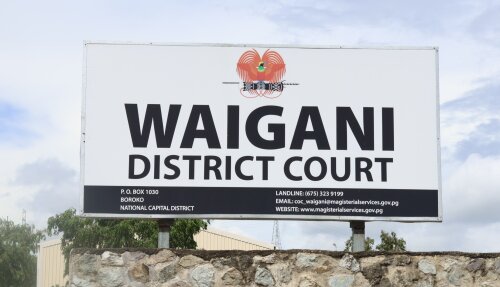Best Restructuring & Insolvency Lawyers in Papua New Guinea
Share your needs with us, get contacted by law firms.
Free. Takes 2 min.
Or refine your search by selecting a city:
List of the best lawyers in Papua New Guinea
About Restructuring & Insolvency Law in Papua New Guinea
Restructuring and insolvency law in Papua New Guinea addresses situations where individuals, companies, or partnerships are unable to meet their financial obligations. The legal framework provides procedures for restructuring debt, managing insolvency, and protecting the rights of creditors and debtors. The primary objective is to ensure that economic distress is managed fairly, assets are maximized for creditor returns, and, where possible, viable businesses are preserved. While influenced by other common law systems, Papua New Guinea’s legal system has developed unique features tailored to its economic and social context.
Why You May Need a Lawyer
Engaging a lawyer is crucial when facing restructuring or insolvency challenges in Papua New Guinea. A qualified legal professional can help in a variety of situations, including:
- When a business can no longer pay its debts and wants to explore voluntary administration or restructuring options
- When creditors seek to recover outstanding debts through legal processes
- When directors or business owners are unsure about their legal duties or risks associated with insolvency
- When an individual’s personal debts become unmanageable and bankruptcy is a possible outcome
- When stakeholders need to negotiate repayment terms or debt settlement agreements
- When disputes arise among creditors or between debtors and creditors
- When investigating the financial affairs or suspected misconduct of insolvent companies
Lawyers provide guidance on rights and responsibilities under local law, representation in court proceedings, and advice on structuring deals that can avoid insolvency altogether.
Local Laws Overview
Papua New Guinea’s restructuring and insolvency laws are primarily governed by the Companies Act 1997 and the Bankruptcy Act (Chapter 253). Key features of the local legal framework include:
- Voluntary Administration: Businesses facing financial difficulty may appoint an administrator to take control, investigate affairs, and propose a plan for creditor consideration.
- Liquidation: If a company cannot be saved, liquidation provides a process for winding up, selling assets, and distributing proceeds to creditors.
- Receivership: Creditors with secured interests in assets may appoint a receiver to collect and sell property to recoup debts.
- Bankruptcy: For individuals, bankruptcy allows for fair distribution of assets among creditors and offers a fresh start, subject to statutory conditions.
- Creditor and Debtor Rights: The law outlines clear rights and obligations for all parties, including notification, claims, and repayment order of priority.
- Directors’ Duties: Directors must act in the company’s and creditors’ best interests when insolvency is imminent, or they risk personal liability.
- Cross-Border Insolvency: With growing international trade, the courts may address insolvency cases with foreign elements, though this area is still developing.
Understanding these provisions is essential for anyone dealing with financial distress, whether they are creditors, debtors, or stakeholders in an affected business.
Frequently Asked Questions
What does insolvency mean in Papua New Guinea?
Insolvency occurs when an individual or company cannot pay its debts as they fall due. There are formal procedures established by law to address such situations fairly and efficiently.
What is the difference between restructuring and liquidation?
Restructuring aims to rescue a financially troubled business through new agreements with creditors, improved management, or operational changes. Liquidation is the process of closing a business, selling its assets, and repaying creditors.
Can individuals apply for bankruptcy in Papua New Guinea?
Yes, individuals who cannot pay their debts can apply to be declared bankrupt. Bankruptcy is a legal status that restricts certain activities but allows for the equitable distribution of assets among creditors.
How are creditors paid during liquidation?
Creditors are repaid in a specific order of priority set by law. Secured creditors are paid first from specific assets, followed by unsecured creditors and finally shareholders, if any surplus remains.
What responsibilities do company directors have during insolvency?
Directors must act in good faith, avoid trading while insolvent, and cooperate with insolvency practitioners. Failure to do so may result in personal liability or legal action.
What is voluntary administration?
Voluntary administration is a process where an independent administrator is appointed to assess the company’s affairs and propose arrangements with creditors to either save the business or provide a better outcome than liquidation.
Can a creditor force a company into liquidation?
Yes, if a company fails to pay its debts, a creditor can apply to the court to have it wound up and a liquidator appointed to collect and distribute assets.
Are there alternatives to bankruptcy for individuals?
Yes, alternatives include negotiating payment plans or informal settlements with creditors, and seeking professional debt counseling before considering bankruptcy.
What is the role of a receiver?
A receiver is appointed to manage or sell specific assets that have been used as security for a loan. Their primary duty is to recover the lender’s money from the proceeds of sale.
Do cross-border insolvency laws apply in Papua New Guinea?
Cross-border insolvency is a developing area of law in Papua New Guinea. The courts may recognize foreign insolvency proceedings, but each situation is approached case by case.
Additional Resources
If you or your business is facing restructuring or insolvency issues, the following resources may be helpful:
- Investment Promotion Authority (IPA): Oversees company regulation and administration
- Registrar of Companies: Maintains company records and insolvency filings
- PNG Law Society: Professional body for legal practitioners, can refer specialized lawyers
- Court Registries: For access to filing procedures and court forms relevant to insolvency matters
- Insolvency Practitioners: Accountants and administrators specializing in restructuring and insolvency
- Financial Counseling Services: Non-profit and community organizations offering free or low-cost debt advice
Next Steps
If you believe you need legal assistance for a restructuring or insolvency matter in Papua New Guinea:
- Act quickly, as delays may limit your options and increase risks
- Gather all relevant documents, such as financial statements, contracts, loan agreements, and correspondence with creditors
- Contact a lawyer or insolvency specialist who can provide advice tailored to your specific situation
- Ask about alternative options to manage debt before deciding on formal insolvency processes
- Follow legal advice closely and communicate openly with your legal representative
Navigating restructuring and insolvency can be complex and stressful. Professional legal support ensures your rights and interests are protected every step of the way.
Lawzana helps you find the best lawyers and law firms in Papua New Guinea through a curated and pre-screened list of qualified legal professionals. Our platform offers rankings and detailed profiles of attorneys and law firms, allowing you to compare based on practice areas, including Restructuring & Insolvency, experience, and client feedback.
Each profile includes a description of the firm's areas of practice, client reviews, team members and partners, year of establishment, spoken languages, office locations, contact information, social media presence, and any published articles or resources. Most firms on our platform speak English and are experienced in both local and international legal matters.
Get a quote from top-rated law firms in Papua New Guinea — quickly, securely, and without unnecessary hassle.
Disclaimer:
The information provided on this page is for general informational purposes only and does not constitute legal advice. While we strive to ensure the accuracy and relevance of the content, legal information may change over time, and interpretations of the law can vary. You should always consult with a qualified legal professional for advice specific to your situation.
We disclaim all liability for actions taken or not taken based on the content of this page. If you believe any information is incorrect or outdated, please contact us, and we will review and update it where appropriate.
Browse restructuring & insolvency law firms by city in Papua New Guinea
Refine your search by selecting a city.















